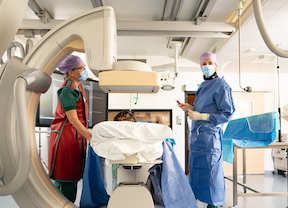PhD student van het ENSEMBLe project: European Newborn Study: Early Markers for a Better LifE
PhD student van het ENSEMBLe project: European Newborn Study: Early Markers for a Better LifE
Job description
Cerebral palsy (CP) is the leading cause of physical disability in children but is often diagnosed too late, delaying intervention until after critical neuroplastic windows have passed. Recent guidelines have outlined reliable tools for early CP detection, combining brain MRI, EEG, and clinical assessments such as the General Movement Assessment (GMA) and the Hammersmith Infant Neurological Examination (HINE). However, current predictive models lack integration of these modalities and precision in individualized diagnosis and prognosis.
As part of the ENSEMBLE Project—a multinational study funded by the Fondation Paralysie Cérébrale—you will help develop a machine learning-based multimodal prediction tool for CP diagnosis and long-term outcomes. This tool will integrate advanced clinical assessments to provide personalized prognoses for motor, cognitive, and behavioral outcomes, enhancing family counseling and early intervention strategies.
Your responsibilities include:
Exploring how early diagnosis impacts parental well-being and social dynamics, including disclosure experiences and the role of support systems.
As part of the ENSEMBLE Project—a multinational study funded by the Fondation Paralysie Cérébrale—you will help develop a machine learning-based multimodal prediction tool for CP diagnosis and long-term outcomes. This tool will integrate advanced clinical assessments to provide personalized prognoses for motor, cognitive, and behavioral outcomes, enhancing family counseling and early intervention strategies.
Your responsibilities include:
- Developing and validating a machine learning prediction model for CP and related outcomes using neonatal MRI, EEG, GMA, HINE, and clinical data.
- Coordinating patient inclusion, data collection, and analysis across multiple NICUs in five European countries.
- Harmonizing protocols across study centers and engaging with families to gather clinical and psychosocial data.
Exploring how early diagnosis impacts parental well-being and social dynamics, including disclosure experiences and the role of support systems.
Specifications
- max. 36 hours per week
- max. €3824 per month
- Utrecht View on Google Maps
Requirements
We are looking for a motivated, team-oriented, and empathetic researcher with:
We consider it an advantage if you bring either of the following:
Deadline for this application is the 31st of January 2025. Selected applicants are then invited for the first interviews on the 3rd of February between 10 AM -2 PM. If you are selected after that, you will be invited for a second round of interviews on the 6th of February between 1-5 PM.
The contract commences on the 1st of April 2025.
- A Master’s degree in Technical Medicine, Biomedical Engineering, Neuroscience & Cognition, or a related field.
- A strong interest in applying machine learning to clinical care.
- Excellent communication skills and the ability to engage with parents in high-stress situations.
- Proficiency in English, both spoken and written.
We consider it an advantage if you bring either of the following:
- Experience in MRI brain imaging and/or EEG analysis.
- Background in machine learning models or working with large datasets.
Deadline for this application is the 31st of January 2025. Selected applicants are then invited for the first interviews on the 3rd of February between 10 AM -2 PM. If you are selected after that, you will be invited for a second round of interviews on the 6th of February between 1-5 PM.
The contract commences on the 1st of April 2025.
Conditions of employment
The maximum salary for this position (36 - 36 hours) is € 3.824,00 gross per month based on full-time employment.
In addition, we offer an annual benefit of 8.3%, holiday allowance, travel expenses and career opportunities. The terms of employment are in accordance with the Cao University Medical Centers (UMC).
In addition, we offer an annual benefit of 8.3%, holiday allowance, travel expenses and career opportunities. The terms of employment are in accordance with the Cao University Medical Centers (UMC).
Department
You will join the Department of Neonatology at the Wilhelmina Children’s Hospital (WKZ), an internationally recognized neonatal neurology expertise center. Collaborating with neonatologists, rehabilitation specialists, machine learning experts, and the Family Advisory Council (FAC), you will work at the intersection of clinical care and research. FAC will support co-creation of recommendations and strategies for implementing ML tools in neonatal care.
The department of Neonatology specializes in understanding and treating brain injuries in critically ill newborns, utilizing advanced brain imaging, bedside neuromonitoring, and standard long-term follow-up.
The department of Neonatology specializes in understanding and treating brain injuries in critically ill newborns, utilizing advanced brain imaging, bedside neuromonitoring, and standard long-term follow-up.
Additional information
Specifications
- PhD; Research, development, innovation
- Health
- max. 36 hours per week
- max. €3824 per month
- University graduate
- 2024-5468
:fill(white)/logos/umcu-en-wide.jpg)
